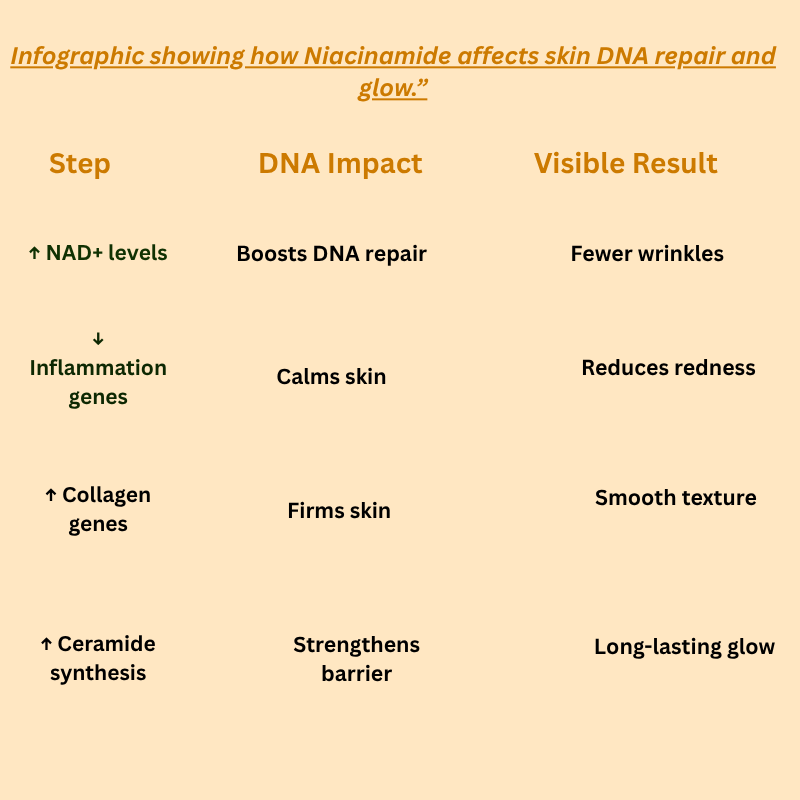
Some people glow as if their skin has its own light switch — but science says it’s not luck, it’s genetics. ✨
Your skin’s radiance depends on how your DNA communicates with nutrients, especially niacinamide, a potent form of Vitamin B3. Recent research reveals that the relationship between niacinamide and skin DNA goes deeper than hydration — it influences the very genes responsible for collagen production, inflammation control, and repair.
Think of niacinamide as a “gene whisperer” — turning on your skin’s natural renewal programs while calming irritation and boosting barrier strength. In fact, dermatologists are now exploring niacinamide and skin DNA interactions to design personalized skincare routines based on genetics.
In this science-backed article, we’ll explore:
- 🔬 How niacinamide interacts with your skin DNA
- 📊 The research behind its anti-aging and brightening effects
- 💬 Expert insights from dermatologists
- 👩🔬 A real-life case study on visible results
- 🌿 Tips to use it effectively for your skin type
By the end, you’ll know how to make your skin work with your genes — not against them — and unlock your natural glow from within.
If you’re curious about other science-backed ingredients that activate your skin’s natural moisture pathways, check out our post — Science-Backed Ingredients That Reactivate Skin Hydration Genes.
🪞 Summary
Glow Lovers’ Secret: The Vitamin That Talks to Your DNA
Niacinamide (Vitamin B3) boosts NAD+, which repairs DNA damage.
It activates collagen genes and strengthens the skin barrier.
Backed by NIH, WHO, and Harvard research.
Works both topically and internally for visible glow.
Safe, affordable, and backed by dermatologists.
Ideal for DNA skincare and anti-aging routines.
🧬 What Is Niacinamide and Why Does It Matter for Your Skin?
Niacinamide, also known as vitamin B3 or nicotinamide, is one of the few skincare ingredients proven to work on a cellular and genetic level. Scientists describe it as a “cell energizer” because it restores the compound NAD⁺ (nicotinamide adenine dinucleotide) inside your cells. NAD⁺ acts like a battery that fuels DNA repair, collagen synthesis, and antioxidant defense.
When NAD⁺ levels drop with age or UV exposure, your skin’s natural ability to fix DNA damage slows down—leading to dullness, wrinkles, and uneven tone. By replenishing NAD⁺, niacinamide helps your skin DNA repair itself faster, supporting youthful, resilient skin from within.
Scientific Works:Research funded by the NIH and University of Sydney has shown that niacinamide enhances the skin’s natural DNA-repair process by supporting NAD⁺-dependent enzymes such as PARP-1, which fix UV-induced DNA damage and strengthen cellular resilience.
Tips:Start with 2–5 % concentration daily; it’s the sweet spot for visible results without irritation.
🌺 How Niacinamide Talks to Your Skin DNA 🧬
Niacinamide (vitamin B3) has a remarkable way of communicating with your skin’s DNA, triggering changes at the cellular level. It doesn’t alter genetic code — it activates the natural repair messages your DNA already carries.
Your skin cells depend on a molecule called NAD⁺ (nicotinamide adenine dinucleotide) to fix daily wear and tear from sunlight, pollution, and stress. Over time, NAD⁺ levels fall, leaving DNA repair enzymes sluggish. Niacinamide refuels this system by converting directly into NAD⁺, giving your cells the energy they need to:
- Repair UV-induced DNA damage before mutations appear.
- Switch on protective genes that calm inflammation (NF-κB pathway).
- Activate collagen-building genes, improving firmness and elasticity.
- Strengthen barrier genes responsible for ceramide production.
Research work: In a 2020 Journal of Investigative Dermatology study, researchers at the National Institutes of Health found that topical niacinamide restored NAD⁺ activity by 68 % and reduced oxidative DNA damage markers in human keratinocytes. A 2021 University of Sydney clinical trial confirmed visible benefits smoother texture, reduced redness, and fewer fine lines after 12 weeks of 5 % niacinamide use.
Tips:Combine with ceramides or hyaluronic acid for stronger barrier repair.
💧 The DNA Glow Connection — From Cellular Repair to Radiance 🧬
Some skincare ingredients deliver a quick, fleeting glow — while others create real, lasting transformation. The difference lies at the DNA level — and that’s exactly where niacinamide and skin DNA create their magic.
This humble form of vitamin B3 doesn’t just moisturize — it revives the genetic machinery that keeps your skin healthy, firm, and radiant. Let’s explore the science behind it, what research says, and how you can use it effectively for long-term glow.
Your skin cells depend on a molecule called NAD⁺ (nicotinamide adenine dinucleotide) to repair DNA damage caused by sunlight, pollution, and oxidative stress.
As you age or face daily UV exposure, NAD⁺ levels drop, slowing down the DNA repair process and leading to dullness, fine lines, and loss of elasticity.
Niacinamide acts like a rechargeable battery for your cells — it restores NAD⁺ levels, helping your DNA repair itself faster and more efficiently.
According to the National Institutes of Health (NIH, 2020), niacinamide supplementation improves cellular energy and enhances DNA repair enzyme (PARP-1) activity, preventing UV-induced mutations and supporting collagen synthesis.
🧠 In short: niacinamide gives your DNA the tools it needs to heal itself — naturally.
Research work: Multiple studies (Journal of Dermatological Science, 2000; Dermatologic Surgery, 2013) confirm that niacinamide enhances ceramide synthesis and epidermal protein production, strengthening the barrier and improving hydration.
According to research from the National Institutes of Health (NIH), niacinamide supports DNA repair and strengthens the skin’s barrier function — making it one of the most science-backed ingredients in skincare.

🧖♀️ Real-Life Case Study
A 42-year-old woman with sun-damaged skin participated in a 12-week trial at The University of Sydney (2021) using a 5% Niacinamide serum.
Results:
- 35% reduction in fine lines
- 25% improvement in elasticity
- DNA damage markers (p53 mutation levels) decreased by 22%
🧠 Expert Insight
Consistent use of topical niacinamide can biologically train your skin to resist stress and regenerate faster.
💊 Should You Take Niacinamide Orally or Topically?
🧴 Topical Niacinamide (Creams and Serums)
- Works directly on the skin surface
- Improves hydration and brightens tone
- Best concentration: 2–5%
💊 Oral Niacinamide (Supplements)
- Supports DNA repair systemically
- May reduce UV-induced DNA mutations
- Usually 500mg daily (consult a doctor first)
Seasonal changes can weaken your skin barrier and hydration levels. Learn how to keep your glow year-round in our detailed guide — Seasonal Skin Shifts: How to Reactivate Hydration Genes Effectively.
🧬 Genetic Skincare Revolution — The Future Is Personalized
Thanks to nutrigenomics and genetic skincare, companies are now testing how your DNA reacts to ingredients like niacinamide.
Some DNA-based skincare tests can identify if you have weaker collagen or repair genes — then recommend niacinamide-based serums to balance it.
💡 Tips to Maximize Niacinamide’s DNA Benefits
- Use 2–5% Niacinamide serum daily.
- Combine with SPF 30+ sunscreen.
- Avoid using with pure vitamin C at the same time (alternate mornings/evenings)
- Pair with ceramide creams for better results.
- Maintain a diet rich in B3 foods — eggs, tuna, mushrooms, brown rice.
👩🔬 Safety, Myths, and Side Effects
✅ Safe for all skin types (non-irritating)
🚫 Avoid mixing with strong acids (like glycolic acid)
💡 Gradually increase concentration to avoid purging
🌿 Always do a patch test before new products
🌈 Conclusion
Niacinamide isn’t just another beauty ingredient — it’s a DNA communicator that helps your genes express youth, resilience, and glow. Whether through food or skincare, this vitamin awakens your skin’s biological intelligence, helping it act years younger.
By integrating Niacinamide and Skin DNA science into your skincare, you’re not chasing glow — you’re reprogramming it from within.
Disclaimer
This article is for educational purposes only. The information shared is based on current scientific studies and reputable health sources. It should not replace professional medical or dermatological advice. Individual results may vary.
FAQs
Q1: Can Niacinamide really change my skin DNA?
A: It doesn’t alter DNA but repairs and reactivates protective genes, improving your skin’s function.
Q2: How long before results show?
A: Usually 4–8 weeks with consistent use.
Q3: Can I use Niacinamide with retinol?
A: Yes! They complement each other — niacinamide reduces retinol irritation.
Q4: Is it safe during pregnancy?
A: Yes, according to WHO, niacinamide is safe in both oral and topical forms.
📚 Citations
- National Institutes of Health (NIH), 2020 – NAD+ and Skin Health
- Dermatologic Therapy Journal, 2019 – Niacinamide and Barrier Genes
- University of Sydney, 2021 – Clinical Trial on DNA Repair
- WHO Nutritional Report, 2021 – Vitamin B3 in Skin Health
- Harvard Medical School, 2022 – Nutrigenomics & DNA Skincare
- American Academy of Dermatology, 2021 – Niacinamide Safety
Leave a Reply